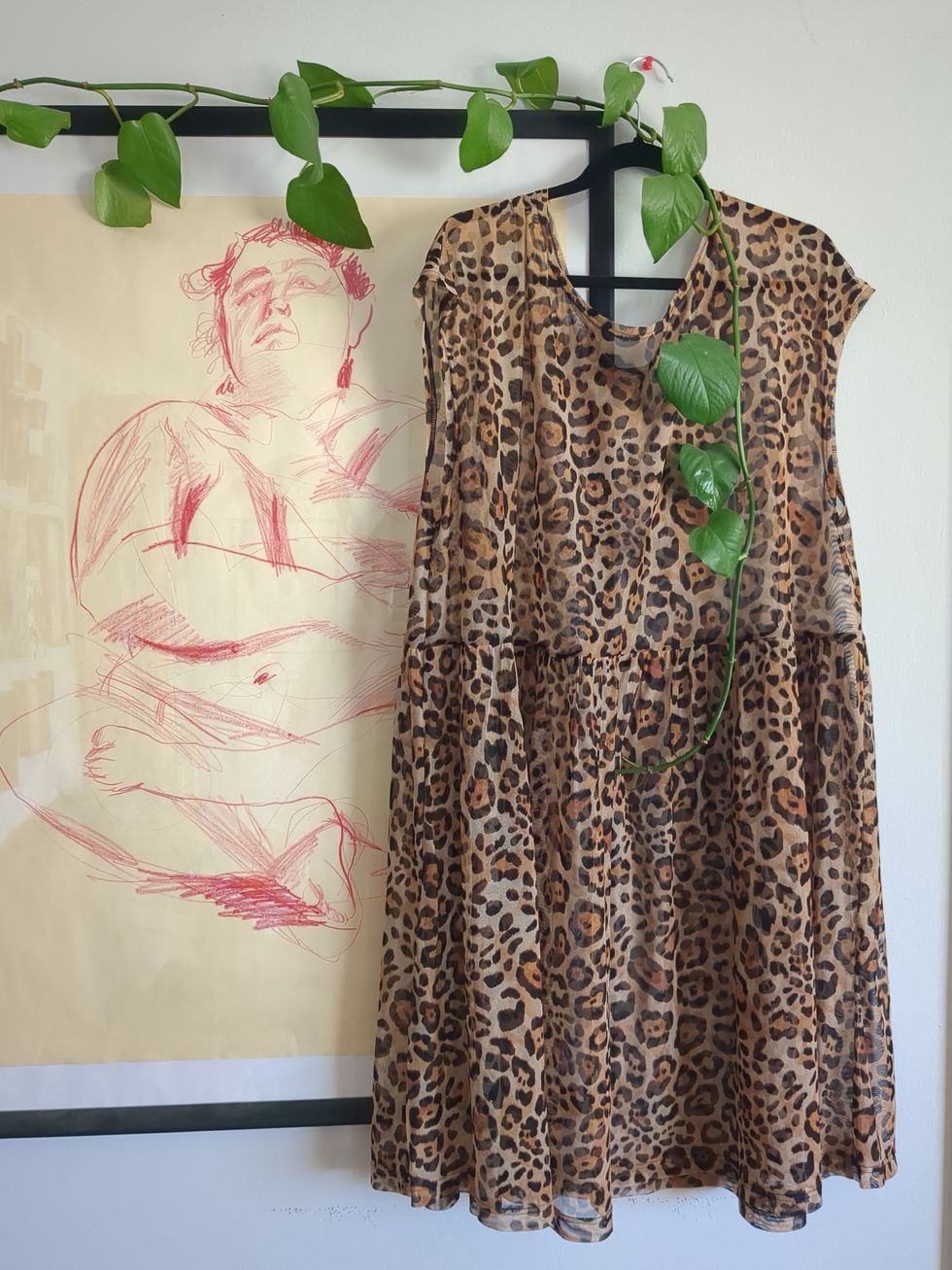Celebrating My Plus-Size Body in the Shadow of Ozempic
I’m headed out for drinks with friends when my seven-year-old alerts me that my dress is see-through. I wave her off with my mascara wand, but she stands adamant, marker-stained knuckles pressed against her hip.
“No, Mama. I can see your bra.” Her voice is steeped in concern, like she’s caught me breaking the rules, or worse, without a clue.
And maybe that’s the case. I’m a plus-size mother careening into middle age; who do I think I am to wear a mesh, leopard-print dress in public?
The dress is one I would have gleefully snatched from the racks in my late teens and early twenties, if similar items had been made in my size. Back then, in the early aughts, celebrities like Britney Spears and Jessica Simpson were dragged through the tabloids when their impossibly low jeans revealed anything but a flat, hard midriff. And yet, despite always being a little rounder, a little softer than my peers at the time, I understood my body was a tool to be harnessed in my constant quest for validation.
Women are socialized to prioritize desirability, and I leaned into this instinct when I was younger, acquiring all my worth from the male gaze. I relinquished my corporeal offerings to any man who would have me. In her memoir, Splinters, Leslie Jamison writes, “Sometimes I counted the men of my past like rosary beads. He loved me. He wanted to sleep with me. Even just, he looked at me. Even just, I came into being, for a moment, because I was visible to him.” Promiscuity can be, and was, fun as hell. But because my motivations came from someplace cavernous, I was always left hungry, even emptier than before.
All those nights with all those men, I’d felt high off their desire, but never walked away feeling empowered. Jamison writes, “It was as if I’d won by making these men want me. But what game? For what prize?” At one point, I got unlucky. Two rapes within a year, before I could legally drink alcohol. Reeling, I declared a detox from carnal pleasures: no sex for a year, which slipped into two. Somewhere along the way, my sense of self distorted like a funhouse mirror. While withholding myself from attention, I became convinced that nobody could want me. Most of all, I didn’t want myself.
Now, in my late thirties and immersed in the work of healing, I’ve found myself drawn to reclaiming desirability, to celebrating my body, and the idea that others might celebrate it, too—but my timing couldn’t be worse. In a 1972 essay, Susan Sontag observed that, “For most women, aging means a humiliating process of gradual sexual disqualification,” an assertion that lives on today. Once immortalized in Amy Schumer’s “Last F**kable Day” sketch, 40 is often presented as a sexual cliff for women, catapulting them to obsolescence. According to male preference in a 2018 study of online dating, female sexual desirability peaks at 18 years old. It’s hard not to feel like I’m coming to this nearly 20 years too late.
On top of my waning youth is the exhausting experience of simply existing in a riotously fatphobic world; choosing to celebrate my plus-size body in the shadow of Ozempic feels fraught at best. The new wave of semaglutide weight-loss drugs has been touted as a way to “end obesity” or to wage “war on obesity.” This framing of my body as a problem to be solved is hard not to internalize.
While my mesh dress aligns with the current moment of sheer clothing, the trend is only celebrated on thin bodies, like those of Florence Pugh and Zoë Kravitz. Anti-fat bias permeates the fashion world: a recent Aerie ad claimed, “Sexy is an energy, NOT a body type,” without featuring any plus-size models; a New York Times list of 2023’s Most Stylish People didn’t include a single fat person and yet a cockroach, a boat, and the Las Vegas Sphere made the cut. Fashion rules decree what I should wear to flatter my body, but vertical lines and dark colors only make me feel small in a way I no longer appreciate. Our society is built around rules meant to protect us, guide us, stifle us. The rules didn’t protect my body from trespasses. I think I might be done with the rules.
When I catch my reflection as I head out the door, my inner voice shrieks, clambering for attention. Your sexy days are over, it insists, noting the whispers of wrinkles congregating under my eyes, the broad swath of belly visible through my dress.
But somewhere from the depths rings a wiser voice that’s growing louder every day. It knows that down the line, if I’m lucky (because aging is an unpromised gift), I’ll come across photos of myself on this night and my heart will swell with tenderness. What a babe, I’ll think. How gorgeous I was, and how young.
Centering this voice allows me to focus on how the dress makes me feel, which is undeniably sexy. Knowing that—feeling that—is finally, at long last, empowering; it’s the elusive condition I chased with random men for so long.
Only this time, I’m not interested in what men want. This time, it’s for me.
Elizabeth Endicott is a Denver-based writer with work in The New York Times, Scientific American, The Guardian, Slate, and more. You can find her on Instagram @weirdbirds.


